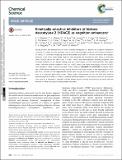Kinetically selective inhibitors of histone deacetylase 2 (HDAC2) as cognition enhancers
Author(s)
Wagner, F. F.; Zhang, Y.-L.; Fass, D. M.; Gale, J. P.; Weïwer, M.; McCarren, P.; Fisher, S. L.; Kaya, T.; Zhao, W.-N.; Reis, S. A.; Hennig, K. M.; Thomas, M.; Lemercier, B. C.; Lewis, M. C.; Moyer, M. P.; Scolnick, E.; Haggarty, S. J.; Holson, E. B.; Joseph, Nadine; Guan, Jisong; Tsai, Li-Huei; ... Show more Show less
Downloadc4sc02130d.pdf (770.3Kb)
PUBLISHER_CC
Publisher with Creative Commons License
Creative Commons Attribution
Terms of use
Metadata
Show full item recordAbstract
Aiming towards the development of novel nootropic therapeutics to address the cognitive impairment common to a range of brain disorders, we set out to develop highly selective small molecule inhibitors of HDAC2, a chromatin modifying histone deacetylase implicated in memory formation and synaptic
plasticity. Novel ortho-aminoanilide inhibitors were designed and evaluated for their ability to selectively inhibit HDAC2 versus the other Class I HDACs. Kinetic and thermodynamic binding properties were essential elements of our design strategy and two novel classes of ortho-aminoanilides, that exhibit
kinetic selectivity (biased residence time) for HDAC2 versus the highly homologous isoform HDAC1, were identified. These kinetically selective HDAC2 inhibitors (BRD6688 and BRD4884) increased H4K12 and H3K9 histone acetylation in primary mouse neuronal cell culture assays, in the hippocampus of CKp25 mice, a model of neurodegenerative disease, and rescued the associated memory deficits of these mice in a cognition behavioural model. These studies demonstrate for the first time that selective
pharmacological inhibition of HDAC2 is feasible and that inhibition of the catalytic activity of this enzyme may serve as a therapeutic approach towards enhancing the learning and memory processes that are affected in many neurological and psychiatric disorders.
Date issued
2014-10Department
Massachusetts Institute of Technology. Department of Brain and Cognitive Sciences; Picower Institute for Learning and MemoryJournal
Chemical Science
Publisher
Royal Society of Chemistry (RSC)
Citation
Wagner, F. F., et al. “Kinetically Selective Inhibitors of Histone Deacetylase 2 (HDAC2) as Cognition Enhancers.” Chemical Science, vol. 6, no. 1, 2015, pp. 804–15. © The Royal Society of Chemistry
Version: Final published version
ISSN
2041-6520
2041-6539